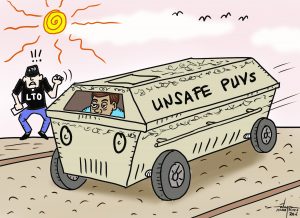Last Holy Week, I participated virtually in the Lenten Triduum Retreat with the theme, “Pilgrims of Hope,” led by Fr. Jboy Gonzales, SJ of the Ateneo de Davao University. This retreat is hosted annually by the Ignatian Spirituality and Formation Office in partnership with the Ateneo Alumni Office and the Ateneo Blue Knight Association.
As an Ateneo alumna, I look forward to these retreats because they not only connect me with fellow alumni, they also nurture my own Ignatian spiritual journey that was formed when I was a student there.
This year’s retreat was unique because it’s musical. As the sub-theme indicated, “Orchestrating Lent: A Journey of Faith Through Music,” we were accompanied by Musica Chiesa, the Chamber Orchestra of the Jesuit Music Ministry.
Fr. Jboy introduced the retreat theme by talking about what pilgrimages are and how all of us are pilgrims. He defined a pilgrimage as “a meaningful journey, imbued with a profound sense of purpose, undertaken with spiritual or deeply personal intentions.”
He explained that a life pilgrimage is often initiated by significant life events or internal shifts that prompt a deep questioning of meaning, purpose, and connection. It is usually prompted by a desire for healing, integration, and wholeness from feeling fragmented or disconnected.
As I reflected on the “Pilgrim’s Theme” (song written by Johnny Go, SJ and Manoling V. Francisco, SJ), I thought about where we are in our pilgrimage as a nation. Where is the Philippines, a predominantly Christian country, in its journey in the Easter Triduum?
The Easter Triduum — a three-day period of religious observance that begins on the evening of Holy Thursday and culminates on Easter Sunday — offers a framework for a transformative process of rebuilding a nation, a societal resurrection that is rooted in service, sacrifice, reflection, and collective action.
Holy Thursday commemorates the Last Supper, where Jesus instituted the Eucharist, and washed His disciples’ feet, embodying humility and solidarity.
Fr. Jboy shared that Holy Thursday is “a pilgrimage of love and service.” The washing of the feet, aside from a call to humility, is also a “reversal of social hierarchy.” It is valuing everyone equally, regardless of status. It is a model of selfless love as Jesus showed love through action, by serving a basic need and actively caring for others.
The Last Supper is about being present and sharing a meal together. It is a pilgrimage that we take together, valuing support and companionship in life’s journey. It affirms the importance of community, of being in communion with God and with others.
When we apply that to rebuilding a nation, this is fostering unity and servant leadership. Just as Jesus’ act of washing feet dismantled hierarchies, we must prioritize inclusive governance and grassroots engagement. It is treating serving others as serving God directly, recognizing the divine in those we help.
A good example of this is post-apartheid South Africa promoting reconciliation through the principle of “ubuntu” (I am because we are; my humanity is tied to yours). Leaders like Nelson Mandela and Desmond Tutu urged citizens to see humanity in one another.
Good Friday marks Jesus’ crucifixion, a moment of profound suffering and sacrifice. It confronts our darkest humanity and exposes our vulnerability.
Part of rebuilding a nation is confronting painful truths and enduring sacrifices to heal. This phase involves addressing historical injustices, reparations, and systemic reforms.
Post-World War II Germany had its reckoning with the Holocaust, including reparations and memorials. It mirrored the death of denial and the rebirth of accountability.
Holy Saturday is a day of vigil. It is a time of waiting in darkness, holding on to hope in the face of despair.
After a crisis, a nation often faces a period of uncertainty, where old systems crumble and new ones are yet to be born. Strategic planning and hope sustain momentum during this period. While waiting, it is not enough to hope, we also need to prepare.
Post-genocide Rwanda prepared by establishing gacaca courts, community-based transitional justice mechanisms to address the overwhelming number of genocide-related cases. Gacaca (short grass) is named after the traditional Rwandan practice of resolving disputes in public spaces. This “in between” phase laid the groundwork for reconciliation.
Easter Sunday celebrates Christ’s resurrection. It is a triumph over death and a call to mission. After sacrifice and darkness comes renewal, healing, and a shift in perspective. Accompanying that shift is finding meaning, spiritual rebirth, and profound transformation.
Easter teaches us that crucifixion is not an endpoint but a necessary prelude to renewal. A nation’s “death” can catalyze collective introspection similar to how the disciples’ despair forged a deeper resolve.
But resurrection is not just spiritual. Christ’s risen body was tangible, urging believers to “touch and see.” Same applies to national renewal. It demands concrete systems to prevent future violent conflicts. The new structures must ensure shared prosperity and accountability.
Resurrection is not just a one-time event, it is a process. Even Christ’s followers doubted initially, and nations, too, will face relapses. Easter’s promise is that renewal is possible. But it is not guaranteed. And that is why Easter is also a call to persistent faith in action.
Easter’s empty tomb is a universal symbol — no one is beyond redemption. Just as Christ’s resurrection shook the status quo, the Philippines can defy hopelessness and cynicism and rebuild. But this demands confronting crucifixion-level truths — the corruption, violence, and inequalities of the existing order — and embracing the disciplined hope, service to others, and presence in community that resurrection requires.
The Easter Triduum, with its rhythm of service, sacrifice, reflection, and rebirth, provides a blueprint for Filipinos as we navigate our current crisis. We can learn a lot from the early Christians who transformed despair into a global movement.
Filipino Catholics loved Pope John Paul II so his words must move us to hope and act: “Do not abandon yourselves to despair. We are the Easter people, and ‘Alleluia’ is our song.” Let us act like we are Easter people and journey together from darkness to light. ###


